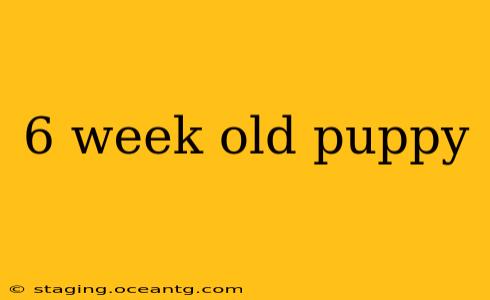Congratulations on welcoming your new furry friend! Having a 6-week-old puppy is an exciting but demanding time. This guide will cover essential aspects of caring for your young pup, addressing common concerns and providing expert advice to ensure a healthy and happy start to their life.
What is the best food for a 6 week old puppy?
At six weeks old, your puppy is still largely reliant on its mother's milk for crucial nutrients. However, if they've been separated from their mother, a high-quality puppy milk replacer is essential. This formula is specifically designed to mimic the composition of mother's milk, providing the necessary proteins, fats, and vitamins for proper growth and development. Consult your veterinarian to determine the best brand and feeding schedule for your specific puppy breed and size. Starting to introduce puppy food, typically a high-quality kibble soaked in warm water to soften it, can begin around this age, but always under veterinary guidance. Never abruptly switch food sources; transition gradually over several days to avoid digestive upset.
What should I do with a 6 week old puppy all day?
A six-week-old puppy needs a balance of stimulation and rest. Their days should revolve around short, frequent feeding sessions (every 2-4 hours, depending on the food and the vet's recommendations), short play sessions, and plenty of naps. Avoid overwhelming your puppy with excessive stimulation; too much activity can be tiring and stressful. Focus on gentle interactions, short periods of supervised play with age-appropriate toys, and quiet rest periods in a safe, comfortable space. Socialization is also crucial at this stage, but it should be done in carefully controlled environments with gentle, vaccinated dogs.
How do I potty train a 6-week-old puppy?
Potty training at six weeks is still very much in its early stages. Puppies this young have limited bladder control and may need to eliminate frequently. Establish a consistent routine, taking your puppy outside frequently – after waking up, after meals, and after play sessions. Reward successful elimination immediately with praise and treats. If accidents happen indoors, clean them thoroughly with an enzymatic cleaner to eliminate the scent and discourage repeat offenses. Consistency and patience are key – expect setbacks, and celebrate the successes!
How much sleep does a 6-week-old puppy need?
Six-week-old puppies sleep a lot – often 18-20 hours a day! This extensive sleep is crucial for their growth and development. Ensure your puppy has a quiet, comfortable, and safe sleeping area. This could be a puppy bed, a crate, or a designated space away from disturbances. Avoid waking them unnecessarily, as sufficient sleep contributes significantly to their well-being.
How often should I feed a 6-week-old puppy?
As mentioned earlier, feeding frequency depends heavily on your puppy's individual needs and your veterinarian's recommendations. If your puppy is still nursing, it may feed every 2-3 hours. If it's weaned, the frequency might decrease slightly, but it's still essential to provide small, frequent meals. Always consult your vet for personalized advice on feeding schedules and appropriate food portions.
How much should a 6 week old puppy weigh?
A six-week-old puppy's weight depends heavily on their breed. Small breeds will naturally weigh less than large breeds. Regular veterinary checkups are essential for monitoring weight and growth. Your vet can tell you if your puppy is gaining weight appropriately for its breed and size. Unexpected weight loss or failure to gain weight should be addressed immediately.
When should I take my 6-week-old puppy to the vet?
It's crucial to have your six-week-old puppy examined by a veterinarian. This initial checkup allows the vet to assess their health, provide guidance on nutrition and vaccinations, and answer any questions you might have. Don't hesitate to contact your vet if you observe any unusual behaviors, such as lethargy, loss of appetite, or diarrhea. Early detection and intervention are crucial for your puppy's health.
This information is for general guidance only and does not replace the advice of a veterinarian. Always consult your vet for personalized care specific to your puppy's breed, health, and development. Enjoy this special time with your new companion!
